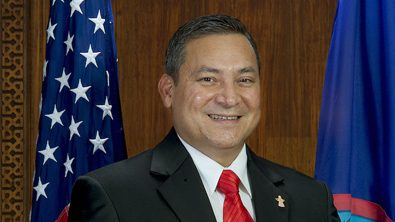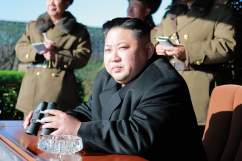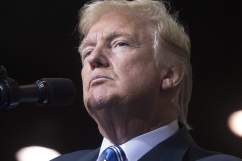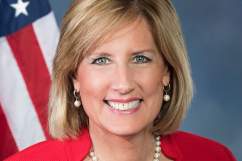
Government of Guam Eddie Baza Calvo has been the Governor of Guam since 2011.
The tiny Pacific island of Guam is now in the headlines after North Korea threatened the U.S. territory. Edward Jerome “Eddie” Baza Calvo is the elected Governor of Guam and has assured the population that there is no immediate threat from North Korea.
The 55-year-old, who was born in the village of Tamuning, is the second consecutive Republican governor of the territory. He won election in 2010 and took office in January 2011 with Ray Tenorio as his Lieutenant Governor.
Calvo has been married to Christine Lujan Sonido since 1987 and has six children. You can follow him on Twitter and Facebook.
Here’s what you need to know about Calvo.
1. Calvo Says There’s No Immediate Threat From North Korea, Despite North Korea’s Comments
Tension between the U.S. and North Korea reached a fever pitch after the latest round of United Nations sanctions were approved. On August 8, The Washington Post reported that a confidential U.S. intelligence report found that North Korea now has a miniaturized nuclear warhead, which can fit inside its missiles.
After that report was published, President Donald Trump threatened North Korea with “fire, fury and frankly the likes of which this world has never seen before.” Then, North Korea responded by announcing it was going over “military options to form attack positions” around Guam.
Calvo responded to this with a press conference on August 9. “I’ve gotten assurances from all levels, both local command and Washington, DC that this island will be defended,” Calvo said in a statement from his office, KUAM notes. “And the United States military has their forces ready to protect and defend not only Guam but all American interests in this region and the homeland.”
Calvo also recorded a special address, insisting that he has assurances from federal authorities that there is no immediate threat to the island, which has a population of just over 162,000.
If there is a threat, Guam officials say they are prepared. “The Guam National Guard stands ready to provide trained and ready personnel and equipment in the event of any federal or local emergency,” Adjutant General Brigadier General Roderick Leon Guerrero told KUAM.
2. Calvo First Endorsed Ted Cruz in 2016, but Later Backed Trump & Met His Transition Team in New York
Calvo is a Republican. Although as a Guamanian he cannot vote in the U.S. presidential election, he endorsed Mitt Romeny in 2012 and Donald Trump in 2016. He first endorsed Texas Senator Ted Cruz during the Republican primary.
But after Cruz dropped out, Calvo endorsed Trump. He also led Guam’s delegates at the Republican National Convention in July. All nine Guam delegates voted for Trump.
“I myself came from the private sector, before becoming senator and then governor,” Calvo said in a statement. He added that Guam’s economy “is doing remarkably well, and a lot of that is because we have fiscal conservancy that is pro-growth, pro-business, pro-military and respects the dignity of individual citizens. Mr. Trump has expressed his full support for these ideals. Donald Trump also promised to appoint a special assistant to the president responsible for day-to-day interaction with the territories, and to form a territory and commonwealth advisory committee (TCAC) tasked with performing a holistic review of all federal regulations affecting the territories.”
After the election, Calvo traveled to New York to meet with the Trump Transition in New York. He said his goal was to “make as many people as possible aware of the problems we face with federal overreach.”
3. Calvo Supports a Push for Guam Statehood
Calvo chairs the Decolonization Commission, which will hold a vote on self-determination or potentially becoming a U.S. state. In a June interview with the Marianas Variety, Calvo said he hopes the commission will learn from Puerto Rico’s recent vote for statehood, which was marred by low turnout. Only 23 percent of registered Puerto Ricans voted.
“That was not a large percentage. It served as an important lesson; we learned from that,” Calvo told the Variety. “Discussions on self-determination have a long history in Puerto Rico and there’s a lot we can learn from them.”
The vote still hasn’t been scheduled because of ongoing court battles about how is eligible to vote for Guamanian independence. The law says that eligible voters are “native inhabitants” who lived on the island before the 1950s. But a federal court called that unconstitutional and the Guam Attorney General is considering an appeal.
“I continue to work collaboratively with the commission and the community to advance this process,” Calvo said in June.
Part of Calvo’s platform included decolonizing Guam. But his second and final four-year term ends this year and he’s admitted that it likely won’t happen before it ends. The Pacific Daily News notes that the non-binding vote was first planned in 1998.
4. Calvo Was a Pepsi Executive Before Entering Politics in 1998
Calvo is the son of former Guam Governor Paul McDonald Calvo and was educated in California. He earned a B.A. in business administration from the Notre Dame de Namur University in Belmont, California.
After graduation, Calvo returned to Guam and found a job at the Pacific Construction Company. He rose to General Manager before he joined the Pespi Cola Bottling Company of Guam as Vice President and General Manager.
While in the private sector, he met his wife, Christine Lujan Sonido. They are the parents of six children, Edward, Vinson, Rosae, Paul Jerome, Melva, and Celine.
In 1998, Calvo turned his attention to politics, running for the Guam Legislature. He won his first race and served five terms as a Senator before running for Governor.
5. Calvo Signed a Bill Legalizing Medicinal Marijuana in Guam
In November 2014, Guam citizens voted to legalize medicinal marijuana. However, it wasn’t until July 2017 that Calvo finally signed a bill into law, reports the Guam Daily Post.
Back in January, The Post reported that Calvo submitted a bill to also legalize recreational marijuana use. The proposed bill would legalize recreational marijuana use for those 21 or older.
“We chose this age to be consistent with existing statute on the age the legislature believes adults have the wherewithal to decide for themselves whether to consume mind-altering substances,” Calvo wrote to the Guam Legislature Speaker.
It would still ban use of marijuana in public places and people would only be able to carry one ounce or less of marijuana, as well as “8 grams or less of the concentrated substance, or the possession of any cannabis-infused product containing 800 mg or less of tetrahydrocannabinol (THC),” the Post notes.



